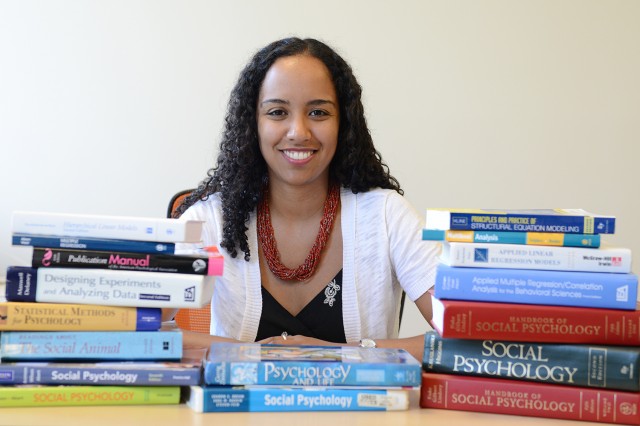Perceived Anti-White Discrimination the Focus of Wilkins’ New Study

Clara Wilkins, assistant professor of psychology, is interested in research showing that whites are increasingly likely to see themselves as victims of racial discrimination, despite persistent gaps in income and other forms of inequality between blacks and whites in the U.S. Perceiving bias against whites is even more pervasive in white young adults than in the population as a whole, with 58 percent of whites aged 18-24 agreeing that, “discrimination against whites has become as big a problem as discrimination against blacks and other minorities.”
In a new study, Wilkins and Joseph Wellman, postdoctoral fellow in psychology, investigated how whites react to claims of anti-white discrimination. Specifically, they were interested in learning how espousing a rosy worldview about basic fairness in society affects those reactions. The results were published online Aug. 15 in the Journal of Experimental Social Psychology in an article titled, “Status Legitimizing Beliefs Predict Positivity Toward Whites Who Claim Anti-White Bias.”
The paper, also co-authored by Cheryl Kaiser at the University of Washington, can be read online here. According to Wilkins, it is the first empirical study demonstrating that whites’ reactions to claims of anti-white bias are shaped by their ideology, and it has important implications for legal cases on topics such as affirmative action.
For their study, the authors had white participants read a story about a white man in his 30s who failed to receive a promotion at work. The promotion was given instead to a co-worker named Tyrone (a stereotypical black name). Half of participants in the study read that the subject claimed, “All this stuff about ‘workforce diversity’ is just reverse racism against guys like me.” Participants in the other condition read a statement by the man saying he was unsure why he didn’t receive the promotion, and concluding, “I guess it was more competitive than I thought.”
Participants were asked to evaluate the white man by rating several statements like, “He seems intelligent,” and “He seems to have a strong work ethic.” Participants were then assessed on their “Status Legitimizing Beliefs,” (SLBs), a set of beliefs asserting that anyone can improve their social status as long as they work hard, are motivated and talented. The assessment measured the extent to which participants agreed with statements like, “America is a just society where differences in status between ethnic groups reflects actual group differences;” “America is an open society where individuals of any ethnicity can achieve social advancement; and “If people work hard, they can almost always get what they want.”
As the researchers expected, most participants were reluctant to sympathize with the white man in the story who claimed to be a victim of discrimination, presumably out of fear that doing so would cause them to be perceived as racist. But those study participants who espoused SLBs viewed the white discrimination complainants much more positively than those who did not. In a later experiment, the researchers found a causal relationship between endorsing SLBs and having a more positive reaction to white discrimination complainants. In fact, they were able to use a simple word scramble exercise to psychologically prime participants with these beliefs, causing them to react more favorably to white discrimination complainants. Participants primed with SLBs also expressed a greater willingness to help the white discrimination complainant, by offering career advice or helping him prepare for a future interview. This finding implies that whites who claim discrimination may enjoy certain advantages in the future, a topic ripe for further study.
According to Wilkins, these studies have important implications for the outcome of court rulings, particularly in affirmative action cases like Fisher v. University of Texas at Austin, which came before the Supreme Court this past term.
“It is apparent that justice isn’t blind, and that judges and jurors who endorse SLBs are more likely to sympathize with whites’ claims of discrimination,” she said. “Given the various ways that SLBs may be primed inadvertently as well as the potential for attorneys to introduce such primes in the courtroom (for example, through statements about how the world is fair)—outside influences on judges and jurors are a real concern.”
Wilkins has been studying perceptions of discrimination against whites and other groups who hold positions of relative advantage in society—such as heterosexuals and men—since she was a graduate student at the University of Washington. She became interested in the topic of perceptions of bias against high status groups after hearing Glenn Beck call president Barack Obama racist.
At Wesleyan, Wilkins has conducted several other studies in this area. For example, she is examining how perceiving bias against whites affects individuals’ propensity to help individuals of different races. She also is exploring ways to frame social change in a way that is welcoming to high-status groups.

